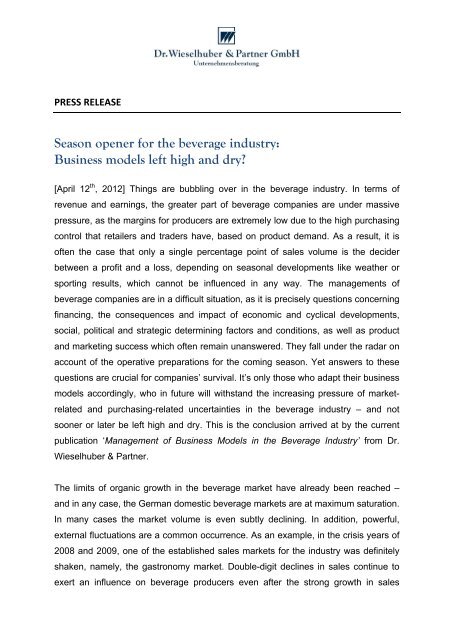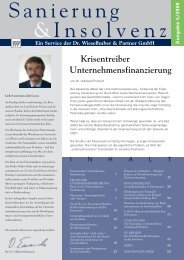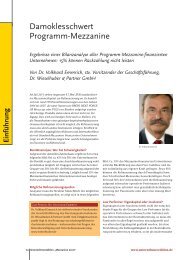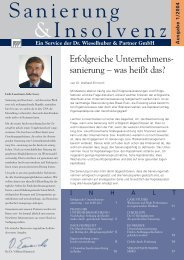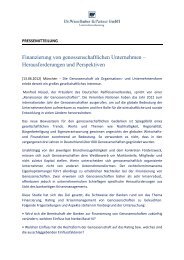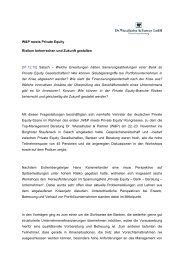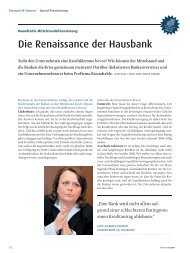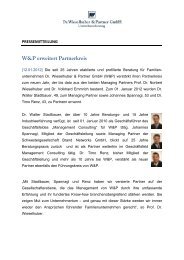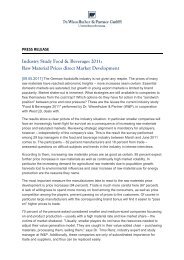Season opener for the beverage industry: Business models left high ...
Season opener for the beverage industry: Business models left high ...
Season opener for the beverage industry: Business models left high ...
You also want an ePaper? Increase the reach of your titles
YUMPU automatically turns print PDFs into web optimized ePapers that Google loves.
PRESS RELEASE<br />
<strong>Season</strong> <strong>opener</strong> <strong>for</strong> <strong>the</strong> <strong>beverage</strong> <strong>industry</strong>:<br />
<strong>Business</strong> <strong>models</strong> <strong>left</strong> <strong>high</strong> and dry?<br />
[April 12 th , 2012] Things are bubbling over in <strong>the</strong> <strong>beverage</strong> <strong>industry</strong>. In terms of<br />
revenue and earnings, <strong>the</strong> greater part of <strong>beverage</strong> companies are under massive<br />
pressure, as <strong>the</strong> margins <strong>for</strong> producers are extremely low due to <strong>the</strong> <strong>high</strong> purchasing<br />
control that retailers and traders have, based on product demand. As a result, it is<br />
often <strong>the</strong> case that only a single percentage point of sales volume is <strong>the</strong> decider<br />
between a profit and a loss, depending on seasonal developments like wea<strong>the</strong>r or<br />
sporting results, which cannot be influenced in any way. The managements of<br />
<strong>beverage</strong> companies are in a difficult situation, as it is precisely questions concerning<br />
financing, <strong>the</strong> consequences and impact of economic and cyclical developments,<br />
social, political and strategic determining factors and conditions, as well as product<br />
and marketing success which often remain unanswered. They fall under <strong>the</strong> radar on<br />
account of <strong>the</strong> operative preparations <strong>for</strong> <strong>the</strong> coming season. Yet answers to <strong>the</strong>se<br />
questions are crucial <strong>for</strong> companies’ survival. It’s only those who adapt <strong>the</strong>ir business<br />
<strong>models</strong> accordingly, who in future will withstand <strong>the</strong> increasing pressure of market-<br />
related and purchasing-related uncertainties in <strong>the</strong> <strong>beverage</strong> <strong>industry</strong> – and not<br />
sooner or later be <strong>left</strong> <strong>high</strong> and dry. This is <strong>the</strong> conclusion arrived at by <strong>the</strong> current<br />
publication ‘Management of <strong>Business</strong> Models in <strong>the</strong> Beverage Industry’ from Dr.<br />
Wieselhuber & Partner.<br />
The limits of organic growth in <strong>the</strong> <strong>beverage</strong> market have already been reached –<br />
and in any case, <strong>the</strong> German domestic <strong>beverage</strong> markets are at maximum saturation.<br />
In many cases <strong>the</strong> market volume is even subtly declining. In addition, powerful,<br />
external fluctuations are a common occurrence. As an example, in <strong>the</strong> crisis years of<br />
2008 and 2009, one of <strong>the</strong> established sales markets <strong>for</strong> <strong>the</strong> <strong>industry</strong> was definitely<br />
shaken, namely, <strong>the</strong> gastronomy market. Double-digit declines in sales continue to<br />
exert an influence on <strong>beverage</strong> producers even after <strong>the</strong> strong growth in sales
volume from last year. Current economic and political crises are increasingly<br />
exacerbating <strong>the</strong> situation. Moreover, <strong>the</strong> <strong>for</strong>midable pressure <strong>for</strong> promotional<br />
campaigns coming from <strong>the</strong> supermarkets and retailers is also placing <strong>the</strong> <strong>beverage</strong><br />
<strong>industry</strong> under pressure, as in many sub-segments, up to two thirds of sales is<br />
consumed by promotional campaigns. The situation on <strong>the</strong> purchasing and<br />
procurement side of things looks no better, according to Jürgen-Michael Gottinger,<br />
<strong>industry</strong> sector expert at Dr. Wieselhuber & Partner and author of this publication: “All<br />
raw materials really know only one direction in prices; and that’s upwards. In <strong>the</strong> long<br />
term, a minimum cost increase of three to five per cent per year <strong>for</strong> raw materials,<br />
additives and working materials is to be expected in many cases. In some cases<br />
even shortages are to be expected”. In light of this, companies need to be robustly<br />
positioned; <strong>the</strong>ir business model must manifest a <strong>high</strong> power of resistance against<br />
external fluctuations.<br />
On <strong>the</strong> social level, consumer behaviour is inducing massive changes to <strong>the</strong><br />
established structures: as a result of <strong>the</strong> ‘de-structuring of daily, everyday life’ –<br />
geographically as well as temporally – food and drink are being consumed at a wide<br />
range of times of <strong>the</strong> day, and less and less at home, but instead increasingly in<br />
canteens, cafeterias, restaurants or to take away: “Companies should not perceive<br />
<strong>the</strong>se changes as a threat, <strong>the</strong>y need to recognise <strong>the</strong> opportunities <strong>the</strong>y present!<br />
The coffee shop chains with <strong>the</strong>ir innovative business <strong>models</strong> have best set <strong>the</strong><br />
precedent and have drawn <strong>the</strong> coffee producers, originally lacking in innovation,<br />
along with <strong>the</strong>m. The best example is that of Nestlé. By means of changes to its<br />
business model, through to being a system provider of coffee capsules and <strong>the</strong><br />
associated coffee machines, Nestlé has simply cut out <strong>the</strong> competition”, Gottinger<br />
says.<br />
If it’s about putting <strong>the</strong> ‘robustness’ and ‘sustainability’ of a business model to <strong>the</strong><br />
test, in a <strong>for</strong>m of stress testing, <strong>the</strong>n of course, <strong>the</strong> factor costs of <strong>the</strong> front end (such<br />
as products and services, market and competition scenarios) as well as <strong>the</strong> back end<br />
(such as organisation, value creation, processes) must also be analysed closely and<br />
precisely. A critical look at <strong>the</strong> business model concerning financing also must not be<br />
<strong>left</strong> out: “The more secure <strong>the</strong> business model is with regard to <strong>the</strong> possibility of
achieving a profit sustainably, <strong>the</strong> more secure financing is – because it’s only when<br />
a company can demonstrate how it can not only achieve profits, but also repay<br />
external funds on time, that it can also obtain credits and loans”, explains Gottinger.<br />
What is clear is that <strong>the</strong> challenges <strong>for</strong> business management in <strong>the</strong> <strong>beverage</strong><br />
<strong>industry</strong> are exceedingly diverse. They demand <strong>the</strong> courage to change. For this<br />
reason, only those who, in <strong>the</strong> first place, seek out new opportunities and, in <strong>the</strong><br />
second place, stave off threats, will develop a business model that is sustainable,<br />
robust and viable <strong>for</strong> <strong>the</strong> long term future.<br />
The current W&P brochure “Management of <strong>Business</strong> Models in <strong>the</strong> Beverage<br />
Industry” is available upon request.<br />
About Dr. Wieselhuber & Partner<br />
Dr. Wieselhuber & Partner (W&P) is an independent, cross-sector top management consultancy <strong>for</strong><br />
family-owned businesses, as well as public institutions. This consistent orientation to particular target<br />
groups and <strong>the</strong> expertise resulting from it has led W&P in <strong>the</strong> past twenty-five years to become <strong>the</strong><br />
leading management consultancy firm <strong>for</strong> family-owned businesses in Germany. With its head office in<br />
Munich, Dr. Wieselhuber & Partner af<strong>for</strong>ds its clients comprehensive expertise in business sectors and<br />
methods and stands out above all due to its competency in <strong>the</strong> area of conflicting priorities of family,<br />
management and business.<br />
Media contact:<br />
Stephanie Meske<br />
Dr. Wieselhuber & Partner Unternehmensberatung<br />
Nymphenburgerstrße 21<br />
80335 Munich, Germany<br />
Tel: +49 (0) 89 28623-139<br />
Email: meske@wieselhuber.de


